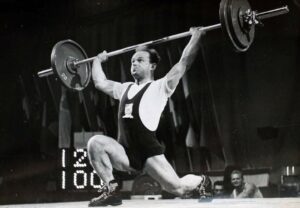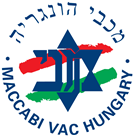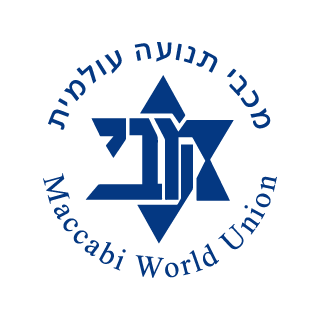Dear friends,
Maccabi has a long list of extraordinary heroes in its 126 years since the foundation of its first Club in Constantinople [1], or the 100 years of Maccabi World Union as a Confederation of Confederations [2]. During
the Shoah, the worst episode of Humankind’s History, many Maccabi athletes and leaders showed their commitment to Maccabi’s ideals of Jewish Continuity and Zionism. Some of them are martyrs who perished defending those ideals; others survived and made out of those ideals a reference for them and for the societies they served.
 Sir Ben Helfgott is one of those outstanding Maccabi figures. Born 22 November 1929, Sir Ben is a Polish-born British Holocaust survivor and former champion weightlifter – well-known as one of two Jewish athletes to have competed in the Olympics after surviving the Holocaust.
Sir Ben Helfgott is one of those outstanding Maccabi figures. Born 22 November 1929, Sir Ben is a Polish-born British Holocaust survivor and former champion weightlifter – well-known as one of two Jewish athletes to have competed in the Olympics after surviving the Holocaust.
Ben was 10 years old in Piotrków Trybunalski, Łódź, Poland, when Germany invaded the country in 1939. In October 1939 all Jews in Piotrkow and the surrounding areas were ordered to move into the ghetto by the 1st November. The ghetto was the first to be established by the Nazis in Europe. At first, fifteen thousand people from the local area were crammed into an area which previously had only housed three to four thousand. Subsequently, another 13,000 Jews were brought to the ghetto from western Poland which was annexed to the Third Reich. Ben and his family moved at the beginning of November. Living conditions were cramped, food was scarce, sanitation was poor and after a time, typhoid spread rapidly. Thousands of people died.
Although only a child, Ben found ways to defy the Nazis. He would not wear the armband with the Star of David imposed by the racist Nazi regime and spent much of his time outside the ghetto – his blond hair assisting him in his pretence to be a non-Jewish Pole. He smuggled newspapers back to the ghetto and became quite knowledgeable about politics and the progress of the war. Ben lived in the ghetto for three years, though it felt. Jewish children were forbidden to go to schools. He continued to spend time outside the ghetto… sometimes taking great risks.
In Piotrkow the systematic deportation and murder of Jews began in October 1942. One evening in 1942 Ben went to work on the night shift. His mother was at home, with her sister and his father was somewhere outside the ghetto. After work he and his fellow Jewish workers were preparing to return to the ghetto but they could not get through. The ghetto had been sealed and people were being rounded up for “resettlement” – a euphemism for deportation to death. In one week approximately 22,000 Jews from a total population of over 24,000 were rounded up. 3000 had already died from starvation and typhoid. Some people accepted that they were being deported to be resettled but rumours about gas chambers began to spread. It was difficult to know what to believe. In fact, forced to travel in terrible conditions, they were sent by rail straight to the death camp at Treblinka. Ben and his fellow factory workers had no news of their families’ whereabouts, though Ben was told that neither of his parents had been seen as the round ups took place.
Ben’s mother and younger sister were murdered by the Nazis in a shooting of about 100 Jews taken to a Piotrkow’s synagogue. It was December 20, 1942.
In July 1943 the Nazis decided to liquidate the small ghetto and the town became Judenrein (“free of Jews” – meaning: deporting and murdering all Jews of the area). Those Jews working in the glass and woodworking factories were left – 1650 persons in all. The rest were deported to other labour camps in Poland.
The Nazis fled from Piotrkow in August 1944. The Russian army was advancing towards them. No one was guarding the remaining Jews and it seemed that the town would soon be liberated but this was not to be. The Warsaw uprising took place and was brutally crushed. Nazi soldiers returned to Piotrkow. There were more round ups. 300 Jewish men were sent to Buchenwald Concentration Camp, Ben and his father amongst them, whilst his older sister Mala and her cousin, Ann, were deported to the Concentration Camp at Ravensbruck. The rest were dispatched to Czestochowa where they were set to work in munitions factories. Ben and his father were in Buchenwald for nearly two weeks, and then Ben was separated from his father and sent to Concentration Camp in Schlieben where anti-tank weapons were produced. Ben’s father was left behind in Buchenwald. In April 1945 Ben was transported to the Theresienstadt camp in Czechoslovakia. Three weeks later the camp was liberated.
After liberation Ben found out that his father had been shot a few days before the end of the war, as he made a bid to escape from a death march. His sister, Mala and his cousin had survived and were in the displaced persons’ camp at Bergen-Belsen.
Ben travelled to the UK with a group of around 300 boys who were sent to Troutbeck Bridge on arrival, all around the age of 16, 30 girls and 20 small children. They arrived on VJ Day [3] and spent time in Windermere in the Lake District. He was finally safe. Ben attended Plaistow Grammar School, in an attempt to make up 6 years of his lost schooling. He enjoyed taking part in sporting activities such as gymnastics, football, athletics and table tennis. He did well at school and relished the chance to return to study. He recalls being a glutton for learning – when he wasn’t bossing the other boys about as a self-appointed captain in their football games. “I was younger than most. But when we raced in the park, I always won.”
His big sporting break was joining the Primrose Club for young survivors, run by Paul “Yogi” Mayer, a German athlete who had been hoping for a place in the 1936 Berlin Olympics until the Nazis banned him because he was Jewish. Mayer saw Helfgott’s potential. That was not surprising: he came first in every sport he took up.
Sport had become almost an obsession – particularly weightlifting. That started when he saw a group of youngsters training. He asked the boys’ coach if he could join in and got a firm “no”. “So I went to the weights myself and started lifting them. The man said, ‘I am not taking responsibility for you.’” He didn’t need to.
In a few short years the victim of Nazi persecution became a champion. Ben was fifteen years old and described himself as a walking skeleton. By 1950 a British citizen, Ben won a series of competitions and became national lightweight champion in the early 50s – including the nation’s 11st (70 kg) championship in 1954 and lightweight champion in 1955, 1956 and 1958. He represented Great Britain at weightlifting in the 1956 Summer Olympics at Melbourne, Australia. He was the captain of the British weightlifting teams at the Olympics in 1956 (Melbourne) and 1960 (Rome). In addition, he was a bronze medal winner at the 1958 British Empire and Commonwealth Games held in Cardiff, South Wales.
Ben became “Sir Ben” by the British Crown, and got the Order of the British Empire, the Most Excellent Order of the British Empire, in 2000.
Sir Ben’s Maccabi story started with the Maccabiot – he became Gold Champion in the lightweight class of 3 Maccabiot: 1950, 1953, and 1957. His life was connected to Sport – and to Jewish Sport, becoming a full member of Maccabi GB. Sir Ben became a true friend and an inspiration to all at Maccabi GB. From supporting the Jewish Community’s activities at the 2012 London Olympics, to attending the Maccabi GB Sports Awards, and in more recent times via the Yellow Candle project for Yom Hashoah… Sir Ben epitomizes the true spirit of being a Maccabean – and a Maccabi GB leader. [4]
Today, Sir Ben is convinced that sport did two things for him: it boosted a sense of fair play and gave him an inner strength. “I could never have survived the Holocaust without that strength,” he says… and… he could never have become a world-class athlete.
Sir Ben assumed his role as a living witness to the Holocaust. He has spent his adult life promoting Holocaust education, meeting with national leaders in the UK to promote cultural integration and peace.
In this hour of pain and immeasurable loss, May God grant that we shall be worthy continuers of the message of life and action bequeathed to us by the murdered victims and the survivors, multiplying Jewish life everywhere through our decisive action in all the Jewish communities in the world, and in our magnificent center, the State of Israel.
During this Yom HaShoah, may God grant that we shall remember the extraordinary content, flowering creativity and productivity of the individual lives and Jewish communities so brutally uprooted.
May God always protect the State of Israel!
And may we always remember, bless, honor and perpetuate by our deeds the lives of the Six Million, for we are their Living Memorial.
Chazak ve’ematz!
Rabbi Carlos A. Tapiero
Deputy Director-General & Director of Education
Maccabi World Union
[1] Today Istanbul, Turkey. The first Maccabi Club was founded there, in 1895.
[2] Maccabi World Union was founded in Carlsbad, Czechoslovakia, during the 12th World Zionist Congress, in 1921.
[3] The day (August 15) in 1945 on which Japan ceased fighting in World War II, or the day (September 2) when Japan formally surrendered.
[4] Thanks to Ashley Lerner, Maccabi GB CEO, for this paragraph on Sir Ben’s involvement in Maccabi GB.






